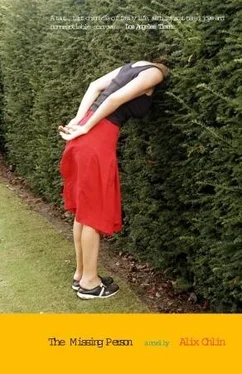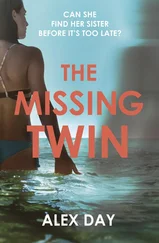“Because of something you saw on TV.”
“Because I fell in love.”
“With a place,” I said, though I meant it as a question, whose answer might encompass her baby. But she just nodded, smiling widely. Her expression was exactly that of a freshly married woman who’d just described how she met her husband. It seemed both ridiculous and plausible to me that she could have moved across the world for the reasons she’d given. All these people — these friends of Wylie’s, and Wylie himself — were motivated by such strange, off-kilter passions. They seemed to do things — leave home, draw plumbing diagrams, move to Albuquerque, New Mexico — just to feel the sway of those passions on their bodies, for the sake of surrendering to them. Irina’s face was flushed, her smile generous. And then the baby woke up.
Psyche scrunched her face up and howled until we left the coffee shop and strolled through the streets, empty and hushed in the afternoon heat. I realized that we were heading in the general direction of Wylie’s place. My take-charge mood apparently had been left behind at the library, and instead of barging in and asking everybody where Wylie was or how I could find him, I decided to stick with Irina for a while and see if I couldn’t figure it out myself. She bent her head and sang a delicate little song to her baby in what I imagined was Czech. In the resplendent sunshine, with her falling hair and radiant cheeks, she looked like a sacred painting. I thought about the picture of Eva Kent in my pocket, her rigid posture and massive belly and burning cigarette — a motherhood that seemed totally unrelated to this one. I wondered how my father had ever come across her or her paintings in the first place, and what had happened to her baby.
Irina had a key. Inside, the shades were drawn and the air was still and close but actually fairly cool. In the kitchen, above the sink, was strung a little clothesline, with cloth diapers, cloth kitchen towels, and plastic bags washed and hung up to dry. It was seriously advanced recycling. Sledge, the skinny brown dog, was curled up in a corner, snoring.
“Thank you so much for my lunch,” Irina said. “I think, if it is not too rude, I may go lie down a little while with the baby now. You can wait here for him if you would like.”
“Wylie’s coming here?”
“I mean Angus.”
“I’m not waiting for him, ” I said quickly, and blushed horribly. Irina smiled and went into the back room off the kitchen as I stood there feeling stupid in every way.
There wasn’t any furniture, so I sat on the floor. The apartment was very quiet. I could hear my own breathing, along with the dog’s. Then he made a deep sighing noise that wasn’t a sigh; a horrid stench overtook the room, and I hurried outside onto the landing, looking at the street full of falling-down student housing, lawns of sheer dirt, trash on porches, tape on windows. Lacking a cigarette or a magazine or anything to help pass the time, I pulled the photograph out of my pocket and examined Eva Kent’s scalpy part and thick fingers. She wasn’t wearing a wedding ring.
Then I heard whistling and someone calling my name. Angus came sauntering down the street, his red hair sticking up, his back straight, his shoulders broad and muscular, his grin showing all his teeth. He was wearing yet another decomposing shirt. The instant I saw him, I knew that we’d be sleeping together again; it was a foregone conclusion. “A woman has needs” was actually the very first thought that went through my mind. I sighed. It was getting to be a very weird summer.
He stopped at the base of the landing and squinted up at me. He was still grinning, and it seemed to be genuine. “I’m so happy to see you,” he said. “I think you have my hat.”
After I told Angus that Irina was sleeping, he crouched down beside me and asked if I’d been drinking my water.
“I know enough to drink water,” I said. My voice sounded surly to my own ears. “That was just a one-time thing.”
“All right.”
“It could happen to anybody.”
“It happened to you, ” he pointed out, raising his red eyebrows. I frowned at him, and he shrugged.
Across the street, a couple of young guys came out from one of the dilapidated houses, one sitting down on their porch, the other leaning back into the shade cast by a large pine tree. They opened cans of beer and lit cigarettes, and the smell of smoke wafted across the street to where we were sitting. It seemed like pretty early in the day to be drinking, though I was hardly one to talk.
“And now I find you sitting out here,” Angus said, “baking in the sun once again, without any sign of water, or even the protection that you yourself pointed out to me is so important. By which I mean a hat.”
“First of all, I’m sitting in the shade. Second of all, the inside of that apartment reeks from your disgusting pet. And third of all, it’s really none of your business.”
“My disgusting pet?”
“That gassy dog.”
“Oh, the dog,” he said, and waved his hand dismissively. “That isn’t a pet. He just lives with us. Pets are little slaves we maintain to convince ourselves that we can be kind to animals, while every other part of our lifestyle promotes the extinction of animal life. You know what’s the most disgusting part of this pet mythology? Paying hundreds of dollars for a purebred while thousands of strays are killed every year in pounds. Anyway, Sledge can come and go as he pleases.”
“But you feed the dog,” I said, “and he’s living in your apartment. Isn’t he your pet in practice, if not in theory?”
He threw back his head and laughed generously, showing the diminishing spray of freckles down his pale neck. “You’re sharp,” he said, “and I like that. You stand outside of things, and observe them, and form rapid judgments. I like that too.”
This didn’t exactly strike me as a compliment. I felt tired then, and annoyed with myself. “It’s just. .” I said, my voice dwindling. He leaned closer to hear me, and I could feel, beneath the general heat of the air, the more specific warmth generated by the closeness of his skin to mine. “You know, I keep looking for Wylie, and he won’t talk to me, and I don’t know why. I’m sorry.”
Angus stood up and pulled me to my feet. We stood there for a second, holding hands, mirrored, swaying a little. “Don’t apologize for anything,” he said.
Inside the apartment, Irina was up and nursing the baby again. Angus went to the kitchen and poured water into his Nalgene bottle, which he handed to me and stared until I drank. Then he nodded — pleased with himself, it seemed— and turned to Irina. “Who’s coming today?”
“I’m not sure,” she said. “Stan and Berto for sure. I don’t know about Wylie.”
“No one ever knows about Wylie,” Angus said, and winked at me. “Maybe he’ll be at the thing tonight. Do you have the maps?”
“Yes, hold on.” Irina reached into the sling, somewhere underneath her baby’s butt, and pulled out a folded, creased piece of paper.
“What’s going on?” I asked, and was conspicuously ignored. Sledge came over and sadly licked my ankle. I found a shallow dish in the kitchen and gave him some water, which he drank in great sloppy mouthfuls. Then I spent a while nosing through the cupboards, which were stocked with neatly labeled plastic containers: rice, dried beans, lentils, oatmeal. There was enough food to keep a group going for weeks, as long as they didn’t mind eating the bomb-shelter diet. I remembered Wylie badgering our dad for more Nilla wafers when we were hiking, which in an attempt to guarantee good behavior were withheld until the last possible moment. I guessed he’d put Nilla wafers behind him by now.
Читать дальше












